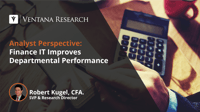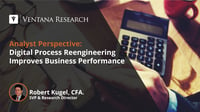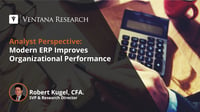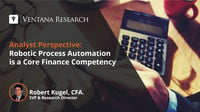Ventana Research recently announced its 2022 Market Agenda for the Office of Finance, continuing the guidance we have offered since 2003 on the practical use of technology for the finance and accounting department. Our insights and best practices aim to enable organizations to operate with agility and resiliency, improving performance and delivering greater value as a strategic partner.
Read More
Topics:
Office of Finance,
Business Intelligence,
Collaboration,
Business Planning,
Financial Performance Management,
ERP and Continuous Accounting,
Revenue,
blockchain,
robotic finance,
Predictive Planning,
lease and tax accounting,
AI & Machine Learning,
profitability management
A year of business uncertainty, lockdowns and operational disruptions forced finance and accounting organizations to adapt and change in many ways that are proving to be permanent. The need to operate virtually resulted in some organizations accelerating their adoption of technology, bringing them closer to achieving a transformation of the finance and accounting function: reshaping the department into an organization that is more forward-looking and strategic. Strategic in the sense of...
Read More
Topics:
Office of Finance,
Business Intelligence,
Data Governance,
Data Preparation,
Business Planning,
Financial Performance Management,
ERP and Continuous Accounting,
blockchain,
robotic finance,
Predictive Planning,
AI & Machine Learning
These days it strikes me that the motto of successful salespeople – "ABC: Always Be Closing!" – should apply equally to corporate controllers, albeit in the accounting sense. This is a reference to an approach to managing the finance department that I have been advocating, which I call "continuous accounting." It is a holistic way of managing the accounting function that, in large part, emphasizes using technology to distribute workloads more evenly over an accounting period, spreading closing...
Read More
Topics:
Office of Finance,
Business Planning,
Financial Performance Management,
ERP and Continuous Accounting,
robotic finance
Business process reengineering (BPR) was a consulting fashion in the early 1990s that spurred many companies to purchase their first ERP systems. BPR proposes a fundamental redesign of core business processes to achieve substantial improvements in market and customer responsiveness, productivity, cycle times and quality. Those early ERP systems provided a platform to manage cross-functional business processes with much greater flexibility and efficiency than had been possible in the past,...
Read More
Topics:
Office of Finance,
Business Planning,
Financial Performance Management,
ERP and Continuous Accounting,
Revenue,
robotic finance,
Predictive Planning,
lease and tax accounting
Ventana Research defines intercompany financial management as a discipline for structuring and handling transactions within a corporation and between its legal entities. IFM is designed to maximize staff efficiency and accounting accuracy while optimizing tax exposure, minimizing tax leakage and ensuring consistent tax and regulatory compliance. Today, IFM is an obscure topic, but I assert that by 2025, one-half of organizations with 10,000 or more employees will have implemented intercompany...
Read More
Topics:
Office of Finance,
Business Planning,
Financial Performance Management,
ERP and Continuous Accounting,
Revenue,
robotic finance,
lease and tax accounting
The objectives of zero-based budgeting are well aligned with what I call integrated business planning, a technology-enabled approach to managing the forward-looking activities of a corporation including forecasting, planning and budgeting. IBP enables every business unit to plan their business in a way that makes sense to them but also makes the numbers in those plans available for company-wide planning, budgeting analysis and reporting. IBP combines operational planning and financial budgeting...
Read More
Topics:
Office of Finance,
Business Planning,
Financial Performance Management,
robotic finance,
Predictive Planning
FourQ is an intercompany financial management (IFM) Solution-as-a-Service provider. IFM is a discipline for structuring and handling transactions within a corporation and between its legal entities, and is designed to maximize staff efficiency and accounting accuracy while optimizing tax exposure, minimizing tax leakage and ensuring consistent tax and regulatory compliance. Today, IFM is an obscure topic, but I assert that by 2025, one-half of organizations with 10,000 or more employees will...
Read More
Topics:
Office of Finance,
Financial Performance Management,
ERP and Continuous Accounting,
Revenue,
robotic finance,
lease and tax accounting
The ERP system is at the core of nearly every organization’s record keeping and business process management. Its smooth and uninterrupted functioning is essential to an organization’s accounting and finance functions. In manufacturing and distribution, ERP manages inventory and logistics. Some organizations use it to handle human resources functions like tracking workers, payroll and related costs.
Read More
Topics:
Office of Finance,
Financial Performance Management,
ERP and Continuous Accounting,
robotic finance
Organizations have long sought ways to achieve a fast but “clean” (accurate) financial close. The most widely accepted benchmark is to be able to close within one business week. Organizations that close within a business week are almost always more competent in how they manage the process and therefore use resources more efficiently. Also, organizations that close their books within six days after the end of the quarter are more likely to provide executives with timely information and respond...
Read More
Topics:
Office of Finance,
Business Planning,
ERP and Continuous Accounting,
robotic finance
Robotic Process Automation (RPA) has emerged as a core digital technology for finance and accounting organizations. It can drive significant gains in productivity and efficiency by automating mechanical, repetitive accounting processes in a continuous, end-to-end fashion. RPA improves efficiency, ensures data integrity and enhances visibility into processes.
Read More
Topics:
Office of Finance,
Business Planning,
Financial Performance Management,
Price and Revenue Management,
ERP and Continuous Accounting,
robotic finance,
Predictive Planning



















